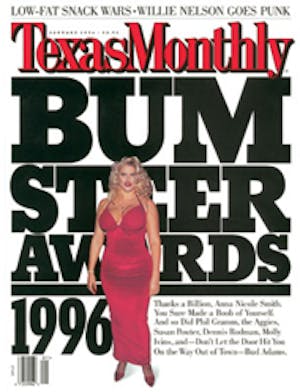Easy Money: People who drive expensive cars can afford a legal wrangle.
THE HOUSTON POLICE DEPARTMENT’S Court Liaison Office is on the fourth floor of the Harris County criminal courthouse, and it’s a couch potato’s paradise. There, officers are paid as much as $25 an hour to kick off their shoes, recline in easy chairs, and watch movies while waiting their turn to testify. Nice work if you can get it—and you can get it if you make a lot of drunken-driving arrests. But a sweet deal for cops on the DWI beat may be a raw deal for innocent motorists.
Here’s why. Driving while intoxicated is a crime committed primarily at night, so most police officers who patrol for drunk drivers work the night shift. But trials take place during the day, which means that any time a DWI citation is challenged and the officer must testify, he gets overtime, or time and a half. If enough of their arrests go to trial, DWI officers can double their salaries. “There’s no question that they make very good money,” says Edward Porter, an assistant district attorney in Harris County.
Too good, according to many Texas defense attorneys—and Texas juries. Lawyers have gotten DWI clients off in Dallas, Austin, and Houston by arguing that officers have a financial incentive to target people who are likely to fight their arrests in court—i.e., those who drive expensive cars (Mercedes owners can afford a legal wrangle) and those who show little if any sign of intoxication (sober people tend to contest DWI charges). “They’ve got their sights set on yuppies in nice cars, not your basic drunk in a beat-up old jalopy,” says Dallas attorney Don Tittle. Tittle should know: He represents nineteen people who are suing the City of Dallas and three recently fired Dallas police officers over wrongful DWI arrests. The plaintiffs—all of whom were found not guilty of DWI or had their arrests thrown out of court—allege that the officers wanted to pad their wallets with overtime pay. Their case is bolstered by an internal police department investigation that revealed that the three cops schemed to rack up overtime by adding each other’s names to arrest reports so they would all be called to testify.
Of course, not every DWI officer is cruising with malicious intent. “I don’t think there’s some great conspiracy going on,” admits Paul Nugent, a defense attorney with the Houston firm of Foreman, DeGeurin, and Nugent. Yet he insists that the system is “set up to tempt” officers short on cash and morals. To remedy the problem, Nugent suggests paying DWI officers for only the time spent on the witness stand. “It’s common for these guys to testify and then lounge around all day until final arguments are over,” he says. Another idea, one partly in place in Prince George’s County, Maryland, is to give officers who testify comp time (time off for time served) instead of overtime wages.
Either way, says assistant D.A. Porter, “the state would have to legislate it before it was accepted by the DWI officers. I’m sure they want to keep things just the way they are.” After all, it’s never easy to pry a couch potato out of an easy chair.






